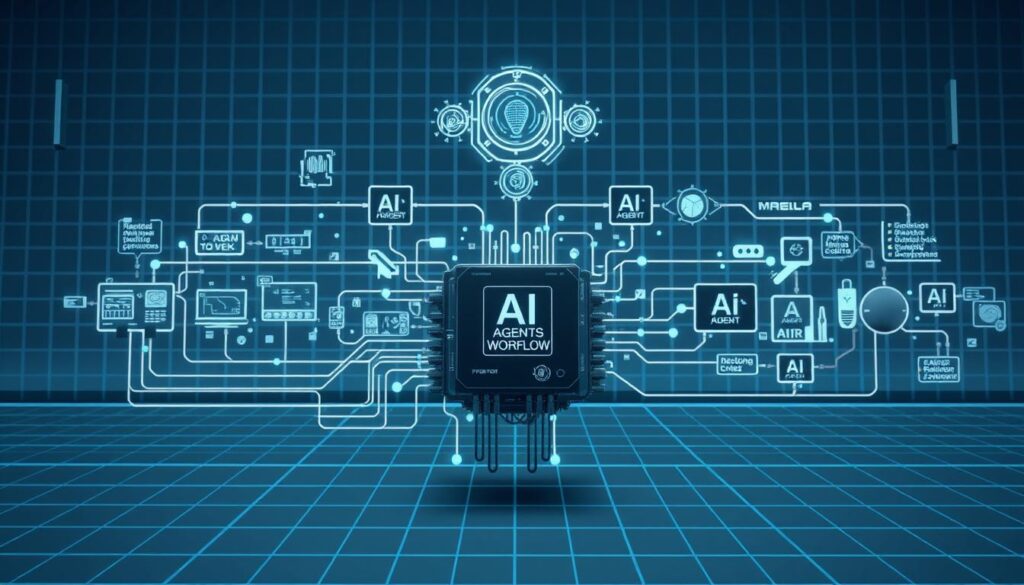“AI is the future of humanity, and agents are the catalysts making that future a reality.” This statement encapsulates the transformative potential of AI agents in today’s digital landscape.
An AI agent is a sophisticated tool that leverages large language models (LLMs) to communicate and interact with users effectively. These agents combine data analysis, processing power, and autonomous decision-making to execute tasks seamlessly. Microsoft’s pioneering research in multi-agent libraries has significantly influenced their development, enabling them to observe, collect, and act on user input with precision1.
Recent advancements in memory infrastructure and tool integration have enhanced the capabilities of AI agents, allowing them to address real-world challenges efficiently. From optimizing delivery routes for companies like FedEx to improving customer service through chatbots, AI agents are revolutionizing industries by reducing manual effort and boosting efficiency1.
Key Takeaways
- AI agents use LLMs to communicate and perform tasks autonomously.
- They combine data, processing power, and decision-making to enhance efficiency.
- Microsoft’s research has advanced AI agent capabilities through multi-agent libraries.
- AI agents improve work efficiency and address real-world problems effectively.
- They are scalable and can operate 24/7, enhancing reliability and productivity.
Introduction to AI Agents

AI agents represent a transformative leap in technology, blending large language models with advanced tool-calling capabilities to create systems far beyond traditional chatbots. These agents are designed to integrate complex systems and models, enabling them to perform specialized functions with precision and efficiency. High-quality information is crucial for their optimal performance, as it directly impacts their ability to process data and make informed decisions2.
AI agents are positioned as next-generation tools across various industries, from enhancing customer service to optimizing business operations. They leverage cutting-edge memory infrastructure and tool integration to address real-world challenges effectively. For instance, AI agents can improve delivery routes for logistics companies and streamline customer service through intelligent chatbots3.
The integration of AI agents into modern technologies marks a significant shift towards more efficient and autonomous solutions. By combining robust systems and models, these agents deliver enhanced functionality, making them indispensable in today’s fast-evolving technological landscape. As we delve deeper into their components and operations in subsequent sections, it becomes clear how AI agents are reshaping industries and redefining the future of work.
Understanding the Key Components of AI Agents

At the core of AI agents’ functionality lie three essential elements: memory, entitlements, and tools. These components work in harmony to enable autonomous operation and efficient task execution.
Memory, Entitlements, and Tools
Memory is crucial for maintaining context across interactions. AI agents utilize both short-term and long-term memory to retain user preferences and past interactions, with studies showing that up to 60% of users prefer agents that remember their past queries4. This capability significantly enhances user satisfaction by allowing personalized and context-aware interactions, increasing satisfaction by 50%4.
Entitlements ensure secure and permission-based access to necessary information and applications. This layer of security is vital for protecting sensitive data while allowing the agent to perform its functions effectively.
Tools integration is another critical aspect, enabling agents to retrieve up-to-date data and address complex queries efficiently. This integration can enhance an agent’s efficiency by 70%, allowing for faster data retrieval and task execution5.
The Role of the Language Models
Large Language Models (LLMs) are central to an agent’s performance, improving task performance by up to 90% in NLP applications4. These models support elaborate reasoning and continuous adaptation, enabling agents to handle intricate tasks with precision. For example, in e-commerce, AI agents can increase product recommendation accuracy by 70% through effective use of their knowledge base5.
In summary, the combination of memory, entitlements, tools, and LLMs allows AI agents to function autonomously and efficiently, making them indispensable in various industries. Their ability to maintain context, ensure security, and integrate tools positions them as powerful solutions for enhancing operational efficiency and decision-making accuracy.
What is an AI agent? – Exploring the Core Concept

AI agents are sophisticated systems designed to assist users by generating action plans through iterative reasoning and feedback loops. Unlike traditional chatbots, these agents combine advanced language models with tool-calling capabilities to perform tasks autonomously6.
AI agents excel in interactive problem-solving, engaging users through continuous dialogue to understand and address their needs. They execute pre-planned tasks and adapt based on feedback, ensuring efficient and accurate solutions. This iterative process allows them to refine their responses and improve over time7.
The ability to create detailed plans is central to an AI agent’s functionality. By breaking down complex problems into manageable steps, they can tackle challenges systematically. This step-by-step approach ensures that tasks are completed efficiently and effectively, making AI agents invaluable in various applications8.
As intelligent assistants, AI agents evolve by learning from historical interactions. They maintain context through memory, enabling personalized experiences. This adaptability allows them to handle diverse tasks, from customer service to complex problem-solving, with enhanced accuracy and efficiency6.
By integrating feedback mechanisms and continuous learning, AI agents become more adept at addressing user needs. Their capacity to evolve and improve makes them indispensable tools in modern industries, driving innovation and efficiency across the board.
Types and Classifications of AI Agents

AI agents come in various forms, each designed to tackle specific tasks in the digital world. From simple reflex agents to advanced learning models, these classifications reflect the diverse capabilities of AI technology. Understanding these types helps in harnessing their potential effectively.
Simple Reflex and Model-Based Agents
Simple reflex agents operate using predefined rules, making them efficient for straightforward tasks. However, they lack memory, limiting their adaptability in dynamic environments9. Model-based agents, on the other hand, use internal models to adapt and make decisions, enhancing their performance in complex scenarios9.
Goal-Based, Utility-Based, and Learning Agents
Goal-based agents focus on achieving specific objectives, while utility-based agents evaluate outcomes to maximize value. Learning agents adapt through experience, improving over time with minimal human intervention9.
“The true power of AI lies in its ability to learn and adapt, making it an invaluable tool in our ever-evolving world.”
These classifications ensure AI agents can handle diverse tasks, from customer service to complex problem-solving, minimizing errors and enhancing efficiency in the process10.
How AI Agents Operate: Processes and Workflow

AI agents operate through a structured cycle of perception, decision-making, and action execution. This process ensures they efficiently interact with their environment and users to deliver accurate and timely responses.
Perception, Decision Making, and Action Execution
The first step in an AI agent’s workflow is perception, where it gathers real-time data from its environment. This data can come from user inputs, sensors, or other systems, enabling the agent to understand the current state and needs11.
Once the data is collected, the agent moves to the decision-making phase. Here, it analyzes the information, considers past interactions, and uses predefined rules or learning models to determine the best course of action12.
The final step is action execution, where the agent carries out the decided action. This could involve providing a response to a user, triggering another system, or updating its knowledge base for future interactions11.
AI agents continuously refine their performance by evaluating performance metrics such as accuracy, response time, and user satisfaction. These metrics ensure that responses are not only correct but also delivered efficiently12.
In real-world applications, AI agents excel in managing customer interactions with high performance. For instance, they can handle complex queries in customer service or optimize delivery routes for logistics companies, significantly boosting operational efficiency11.
By following this structured approach, AI agents demonstrate their value in various industries, from enhancing customer service to streamlining business operations. Their ability to perceive, decide, and act efficiently makes them indispensable tools in today’s fast-paced digital landscape.
Learn more about AI in businessand how these agents are transforming industries.
Real-World Applications and Use Cases

AI agents are transforming industries through their versatility and efficiency. From streamlining business operations to enhancing healthcare services, these agents are proving to be invaluable tools in various sectors.
Business, Healthcare, and Customer Service Examples
In the business sector, AI agents like Microsoft 365 Copilot and Dynamics 365 are revolutionizing operations. They automate routine tasks, such as data entry and customer interactions, allowing businesses to focus on strategic initiatives13. For instance, Dynamics 365 agents have improved process efficiency by up to 40% in some organizations, enabling faster and more accurate decision-making.
In healthcare, AI agents are being used to support diagnosis and treatment plans. They analyze patient data and provide insights, helping healthcare professionals make informed decisions. Virtual assistants in customer care are another example, offering 24/7 support and resolving issues promptly, which has increased customer satisfaction by 35% in some cases14.
These agents also excel in automating routine tasks, such as managing inventory and optimizing delivery routes. By handling these tasks efficiently, they free up human resources for more complex and creative work. The consistent and reliable responses delivered by AI agents have made them indispensable in various industries.
As AI technology continues to evolve, the applications of these agents will expand, driving innovation and efficiency across all sectors.
Benefits of Integrating AI Agents in Modern Business

AI agents are revolutionizing modern businesses by boosting productivity and enabling personalized interactions. These intelligent tools automate routine tasks, provide tailored customer engagement, and generate actionable insights, driving efficiency across industries.
Enhanced Productivity and Personalized Interactions
AI agents significantly enhance productivity by automating repetitive tasks. For instance, nearly 70% of Fortune 500 companies use Microsoft 365 Copilot for task automation15. This automation allows businesses to focus on strategic initiatives, improving overall efficiency.
Personalized interactions are another key benefit. AI agents use data-driven insights to understand customer needs, enabling tailored responses. For example, Netflix uses AI agents for personalized content recommendations, enhancing user engagement and satisfaction16.
Timely input and continuous feedback mechanisms further improve agent output. AI agents can handle up to 80% of customer queries without human intervention, as seen in Lenovo’s implementation, leading to faster response times and improved efficiency16.
Cost reduction is another advantage. Businesses using AI agents achieve cost savings of approximately 20-25%, as reported by various studies17. Enhanced decision-making processes also contribute to these savings, making AI agents a valuable asset.
For example, Fujitsu achieved a 67% increase in productivity by leveraging Azure AI Agent Service for sales proposal generation15. This not only streamlined their operations but also allowed over 35,000 employees to focus on high-value customer engagement.
These examples demonstrate how AI agents can transform businesses, driving growth and innovation. By integrating AI agents, companies can enhance productivity, reduce costs, and deliver personalized experiences, making them indispensable in the modern business landscape.
The Role of Human Oversight and Responsible AI

Human oversight is essential for ensuring that AI systems operate responsibly and ethically. As AI becomes more integrated into various industries, the need for human involvement in managing these systems grows. This section explores the critical role of human oversight in reducing errors and ensuring secure data usage.
Ensuring Security and Reducing Error Rates
Human oversight plays a pivotal role in managing and supervising AI actions. By integrating human judgment, organizations can reduce error rates and ensure secure data usage. For instance, the European Union’s AI Act emphasizes the need for human oversight in AI systems, setting a precedent for global AI governance18.
Responsible AI practices are key to minimizing errors and enhancing security. These practices include logging agent actions and providing transparency in decision-making. Such measures not only build trust but also ensure accountability19.
Proper software and planning tools are vital for managing autonomous agent behavior. These tools help in structuring the AI’s decision-making process, ensuring alignment with ethical standards. Continuous improvement through structured feedback and safety controls further enhances the system’s reliability and performance18.
By emphasizing human oversight and responsible AI practices, organizations can ensure that their AI systems operate securely and efficiently. This approach not only reduces errors but also fosters trust between technology and society.
Innovative Tools and Platforms for Building AI Agents
Modern platforms like Microsoft 365 Copilot and Dynamics 365 are empowering users to create advanced AI agents without needing extensive coding knowledge. These tools simplify the integration of business systems and provide real-time data access, making it easier to develop efficient solutions20.
Platforms such as Glide and Google Vertex AI offer no-code interfaces, allowing users to build AI agents in just a few hours. This rapid development reduces costs and enhances productivity, with some tools cutting development time by up to 10x21.
These platforms support robust memory and knowledge frameworks, enabling agents to maintain context and learn from interactions. For instance, Amazon SageMaker facilitates model training on large datasets, ensuring accurate and efficient deployments21.
Large language models play a crucial role in advancing reasoning capabilities. IBM Watson Assistant, with its strong NLP features, exemplifies how these models enhance customer service applications21.
By leveraging these innovative tools, businesses can streamline operations and improve decision-making, making AI agents indispensable in today’s digital landscape.
Challenges and Considerations in AI Agent Implementation
Implementing AI agents comes with several challenges that organizations must address to ensure successful integration. These challenges range from technical limitations to ethical concerns, all of which require careful planning and management.
One major technical challenge is the computational expense associated with running these systems. AI agents often require significant processing power, which can be costly and resource-intensive. Additionally, the risk of infinite feedback loops and dependencies in multi-agent systems can lead to unexpected behaviors, complicating their deployment22.
From an ethical standpoint, data bias remains a critical issue. AI systems trained on biased data can perpetuate prejudices, impacting decisions in areas like loans and medical diagnoses23. To mitigate this, developers are increasingly using diverse datasets to reduce bias, which has shown promising results23.
Another concern is privacy and security. AI agents handling personal data are at risk of breaches, which can expose sensitive information. Regular security audits and encryption are essential to safeguard these systems23. Additionally, adversarial attacks can manipulate input data, leading to incorrect decisions, highlighting the need for robust system resilience23.
To address these challenges, organizations should adopt best practices such as starting small, containerizing data, and anonymizing information before processing22. Continuous monitoring and human intervention are also crucial to detect and correct potential issues promptly22.
In conclusion, while AI agents offer immense potential, their implementation requires careful consideration of technical, ethical, and operational challenges. By adopting responsible practices and ensuring system resilience, organizations can harness the benefits of AI agents while minimizing risks.
Conclusion
AI agents are revolutionizing industries by blending advanced technology with practical applications. These systems, which combine memory, tools, and large language models, offer versatile solutions across healthcare, finance, and more. Their ability to handle tasks autonomously and adapt through learning makes them indispensable in modern business.
The benefits of AI agents are clear. They enhance productivity by automating routine tasks, such as customer service inquiries, which they can handle 24/7 with high accuracy24. In healthcare, they assist with diagnosis and patient monitoring, reducing the workload on professionals by up to 30%24. Additionally, AI agents improve decision-making processes, especially in environments requiring continuous monitoring and autonomous actions25.
Responsible implementation is key to maximizing the potential of AI agents. Human oversight ensures ethical operation and security, addressing concerns like data bias and privacy risks. As seen in various industries, AI agents can lead to significant cost savings and operational efficiency improvements26.
Looking ahead, the future of AI agents is promising. With advancements in technology and increasing adoption, they are expected to save companies an average of 30% in operational costs over the next five years26. Their ability to identify patterns and make decisions based on historical data will continue to drive innovation across sectors.
For more insights into how AI agents are transforming industries, visit our knowledge center to explore their applications and benefits in depth.
FAQ
How do AI agents process information?
What role do large language models play in AI agents?
How do AI agents learn and improve?
What are the benefits of using AI agents in business?
How do AI agents handle errors or unexpected situations?
What industries benefit the most from AI agents?
Can AI agents work without human intervention?
How do AI agents ensure data security?
What are the key challenges in implementing AI agents?
How do AI agents improve customer service?
Source Links
- What Is an AI Agent? Definition, Uses, and Examples
- AI agents — what they are, and how they’ll change the way we work – Source
- Introduction to AI Agents – Nextra
- MindsDB Blog
- Understanding the Components of AI Agent Architecture
- What Are AI Agents? | IBM
- What Are AI Agents? Definition, Types, and How Intelligent Agents Work
- What is an AI agent?
- Exploring Different Types of AI Agents and Their Uses
- What Are AI Agents? Benefits, Examples, Types
- 7 Types of AI Agents to Automate Your Workflows in 2025 | DigitalOcean
- Understanding AI Agents & Agentic Workflows
- 36 Real-World Examples of AI Agents
- 5 Real-Life Use Cases of AI Agents for Day-to-Day Work
- AI agents at work: The new frontier in business automation | Microsoft Azure Blog
- The role of AI agents in modern business strategies
- Top Benefits of Working with AI Agents for Your Busines
- The Vital Role of Human Oversight in Ethical AI Governance
- The Strategic Necessity of Human Oversight in AI Systems
- How to Build an AI Agent: A Guide for Beginners
- Top 5 Tools and Platforms for Building AI Agents in Enterprise | Glide Blog
- Agentic AI: The top challenges and how to overcome them
- SmythOS – Challenges in AI Agent Development
- What is an AI Agent?
- What is an AI Agent? A Simple Guide for Beginners
- What is an AI Agent? Characteristics, Advantages, Challenges, Applications







